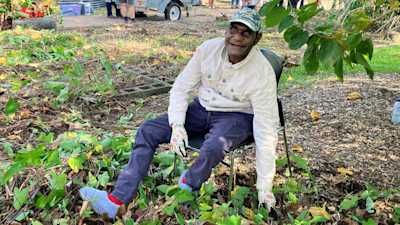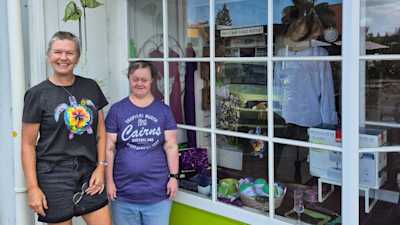“The Voice represents a new way of working together so we can all benefit from the wisdom and experience of Aboriginal and Torres Strait Islander people with disability.”

Image: Have Your Say Naarm panel on stage with MC, Jeff McMullen and an Auslan interpreter.
Emma Bennison, Chief Innovation Officer, Disability Engagement at Life Without Barriers, reflects on the benefits of the Voice to Parliament for Australians with disability. It is written in her own words.
At the invitation of First People’s Disability Network (FPDN), I represented Life Without Barriers on a panel at Have Your Say Naarm (Melbourne) to provide information about the Voice to Parliament and discuss its implications for people with disability.
Initially, I questioned whether it was appropriate for me, a non-Aboriginal person, to contribute, but I was reminded by my First Nations colleagues that non-Aboriginal Australians have a critical role to play because we are the ones who need educating.
We shared our optimism about the practical difference the Voice could make in the lives of First Nations people with disability. The proposed Voice structure includes a standing committee for people with disability. This committee will give First Nations people with disability, (who experience higher rates of disadvantage than the rest of the disabled population), the opportunity to shape Commonwealth Government policy which will ultimately benefit all Australians with disability.
I made the point that in my experience, (no doubt due to the higher rates of disadvantage, persistent racism, and increased discrimination our First Nations colleagues and friends with disability endure every day), they are some of our most effective, constructive, and compassionate advocates.
I expressed my sense of excitement at how the direct influence of First Nations people with disability could contribute to transforming disability policy in this country for the better, something all of us should care about, given disability can happen to anyone at any time.
What’s more, irrespective of how you plan to vote on 14 October, you can't argue with the fact that the policy settings we currently have are doing a disservice to First Nations people and, in particular, to First Nations people with disability, so something needs to change.

Image: Emma on stage at Have Your Say Naarm, speaking as part of the panel.
We also talked about the misinformation currently circulating about the Referendum and the importance of people with disability having access to factual information in formats we can read.
Advocates have rightly raised concerns because the Referendum booklet is currently available via the Australian Electoral Commission’s website in EText and Easy-Read formats, with others to be added progressively during September. This may mean people with disability have less time to consider the information and that those without internet access miss out completely.
For now, accessible resources in Auslan, Easy Read, and Plain English are available via Life Without Barriers, the ABC and SBS have a range of portals and podcasts explaining the Voice and hopefully, the AEC will make other formats available as soon as possible.
This is the first of many conversations to ensure people with disability have the facts and can ask questions ahead of the referendum.
We can all play a role by educating ourselves, and then having courageous conversations with those close to us.

Image: Emma Bennison and Kay Sadler sit next to each other at the Have Your Say Naarm event.
For me, as someone who has privilege, but who knows what it feels like to be silenced and excluded, I feel a strong desire to do all I can to listen to and talk with others about the simple proposition that is being put forward. I want to live in a country where First Nations people are recognised in our Constitution and heard. We will all be better off for it because, as Damian Griffis, CEO of FPDN reminded attendees, Aboriginal people are the thought leaders when it comes to inclusion.
I’ve visited Aboriginal communities where I’ve witnessed first-hand how much more comfortably they approach disability. In fact, there is not even a word for disability in Aboriginal languages.
The Voice represents a new way of working together so we can all benefit from the wisdom and experience of Aboriginal and Torres Strait Islander people with disability.


